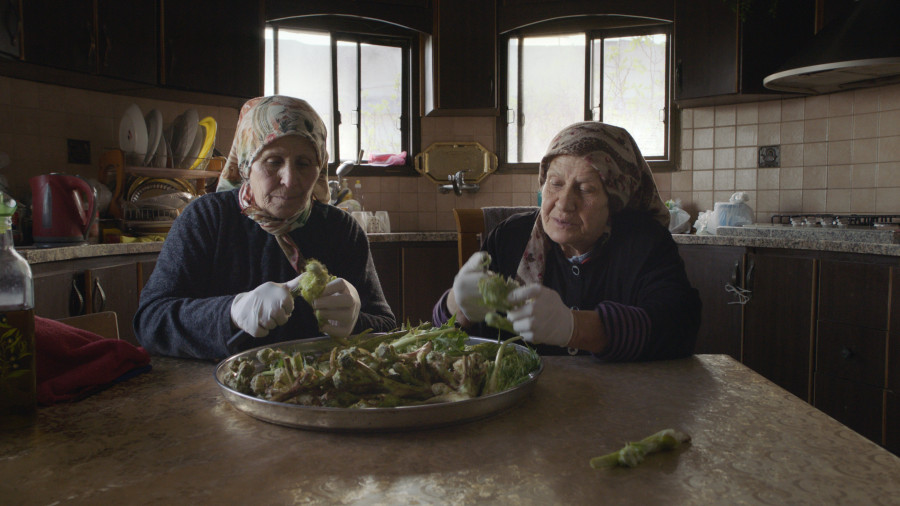Jumana Manna 'Foragers' Film Screenings

Jumana Manna's cinematic feature Foragers (2022) will be screening at The Mercury every Thursday as part of 'Shared Skin'.
The Mercury's Iris Cinema
20 February to 10 April 2025
11:00am to 3:20pm
Shared Skin exhibiting artist Jumana Manna's work explores how power is articulated, focusing on the body, land and materiality in relation to colonial inheritances and histories of place.
Foragers continues Manna’s examination into the paradoxical effects of preservation practices in agriculture, archaeology and law – and how such practices intersect with colonial power structures, exploring the criminalisation of Palestinian herb foraging practices.
The film blends documentary, fiction, and archival footage primarily from Jerusalem and the Galilee region of Palestine/Israel, where Manna grew up and continues to shoot many of her films.
Following the plants from the wild to the kitchen, from the chases between Palestinian foragers and the Israeli nature patrol to the forager’s defence court rooms, this work questions the politics of extinction: who determines what is made extinct and what gets to live on.
Foragers (2022)
Every Thursday, 11am – 3.20pm
20 Feb – 10 Apr
Screening times:
11.00am – first screening
12.05pm – second screening
1.10pm – third screening
2.15pm – fourth screening
Film duration: 63 minutes.
Entry is free.
Enter The Mercury's Iris Cinema via the back door of The Mercury, directly across from ACE's front door.
Feature Image: Jumana Manna, 'Foragers', 2022, 2K Video, Colour, 5.1 surround, 63mins. Courtesy of Jumana Manna and LUX, London
Artist
Curator
Foragers carefully illustrates the importance of these food sources as sustenance and cultural symbol for people whose political autonomy, rights, and land have been under attack for nearly a century. Contextualised against a backdrop of ecological and economic precarity, Manna continues her ongoing inquiry into the paradoxes of maintaining life or records of disappearing practices when enacted by the governing bodies that are at the root of the erasure themselves. Carefully highlighting the multiplicity of life forms that exist between and beyond competing forces, she demonstrates the precarity and beauty in individual and collective resistance and continuity.
The work complements Manna’s previous film Wild Relatives (2018), which explored the politics of seed banking in Syria, Lebanon, and Norway. Foragers carries these concerns of human-plant relations and their governance into the practice of foraging; a historical tradition that continues to be part of the seasonal cuisine in Palestine. Foraging ‘akkoub and za’atar has been criminalised by the Israeli government under the guise of conservation efforts, resulting in heavy fines, trials, and prison sentences for Arabs who are caught gathering these plants. Both intimate and absurdist in tone, Manna’s investigatory and poetic work traces the cultural significance of this tradition and its politicised legislation.
About the Exhibition
Shared Skin investigates how we define relationships and sketches a complex picture of what a family can be.
Shared Skin combines new commissions and existing works by internationally recognised contemporary artists from First Nations and culturally diverse backgrounds, giving thought to familial relationships, interpersonal constellations and their connection to land, society and histories.
Shared Skin addresses how family is defined through gender, class, sexuality and the collision of global identities, cultures and community experiences.
Presented as part of the 2025 Adelaide Festival, Shared Skin is a group exhibition showcasing new commissions and existing works from Hana Pera Aoake (NZ), Atong Atem (AU), Jacob Boehme, KTB + the Narungga Family Choir (AU), Juanella Donovan (AU), Jared Flitcroft (NZ), Jumana Manna (GER), Tuan Andrew Nguyen (USA), Bhenji Ra (AU), Steven Rhall (AU), Marikit Santiago (AU), and Jennifer Tee (NL).
Support
'Shared Skin' is presented and supported by Adelaide Festival.
Bhenji Ra is assisted by the Australian Government through Creative Australia, its principal arts investment and advisory body.
Jennifer Tee’s presentation is made possible with generous assistance from the Mondriaan Fund.
Juanella Donovan is supported by the Australian Government's Regional Arts Fund, which supports the arts in regional and remote Australia.
Jacob Boehme, KTB + the Narungga Family Choir are supported by the South Australian Government through the Music Development Office.
Jumana Manna is presented in partnership with The Mercury.






